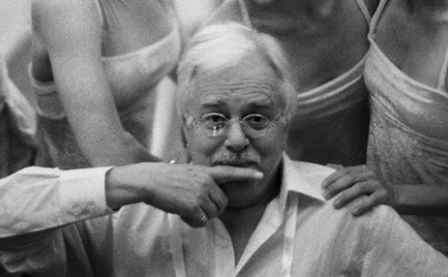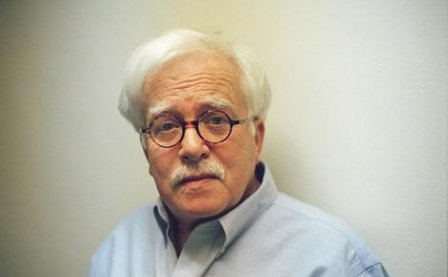Where do you start with a guy who is basically living history? Equal parts Charles Ives and Brian Wilson, Van Dyke Parks has been everywhere for five decades now, composing film scores and writing opulent arrangements for everyone from Joanna Newsom to, well, Silverchair. Yet he’s never been as Van Dyke Parks as he was in 1968, when hot on the heels after bailing on the Beach Boys’ abortive Smile project (for which he served as librettist), Parks dropped Song Cycle, a murky and still unknowable masterpiece of postmodern Americana. That album (so rich with allusions, collaborations, jokes, asides, and American musical history to the point that it’s as much fodder for ethnomusicology as it is music criticism) hinted at — nay, urged — a career as prolific as that beginning was prodigious. However, instead of settling into exploring his talent and pumping out a string of similarly bricolage headscratchers, he’s reigned in his ambitions to deal with the fallout of those heady Smile years while bearing grudges over his repeated commercial failures. Meanwhile, glimpses of the best of him have entered, appropriately enough, into (a) public domain.
Despite being such a self-styled maverick, Parks has courted (and been trammeled to) major label patronage throughout his career to the extent that he’s seldom worked outside the system on his projects. For a composer whose work has been all about pioneering new orientations everything American, he’s never chosen to be his own master. But it makes sense: having been a record executive himself in the big budget 70s, moored to the financial rhythms of Hollywood, he’s always been divorced from the DIY. After all, Wilson grew despairing when “Heroes and Villains” couldn’t match the sales The Beatles were scoring, and from there, the death knell for Smile wasn’t far off. There’s nothing more American than the bottom line, and the lack of popular appreciation for his work had long seemed to stunt his personal creative ambitions. However, the fact that Songs Cycled exists signifies a turning of the mental tide. Twenty-four years removed from his last solo LP (Tokyo Rose, which characteristically sunk without trace), he seems content enough with his own gifts, legacy, and place in the world to screw the money and do what he wants on his own terms. That means his own record label, his own orchestra, and working on his own ideas. Although this isn’t his magnum opus, his 114 Songs, it’s about as warm a reintroduction, rediscovery, and reinvigoration you can get.
As the punning title suggests, Songs Cycled is a revisit in every sense of the word. The album is drawn together not only from five decades of recordings and three centuries of compositions, but six previously released seven-inches; for a man so enamored with the possibilities of giving past traditions new life, it’s refreshing to see him apply the same principles to his own work again. Almost every period of his career is covered, from his 70s calypso detours to his 1994 collaboration with Wilson, Orange Crate Art and onwards. A renewed sense of energy and purpose transforms his old ideas while buoying his old enthusiasms. ”Hold Back Time” — perhaps his simplest love song — is completely transformed from the scratchy, flat original into an ebullient, lifting swoon, and the choice of old material takes in steel band renderings of Saint-Saens’ “Aquarium” to gospel hymns. It may be piecemeal, but it fits neatly together, taking in the bawdy belly laugh of “Sassafras” and the a capella gospel of “The Parting Hand” in stride like a walking tour of the past. When the latter segues into an Ivesian, suspended orchestral version of “Leaning on the Everlasting Arms,” Parks takes the path heavenwards.
Yet the most impressive stuff here is 100% Van D. The chanson “Dreaming of Paris” effortlessly conjures up not only Paris, but the American vision of it as an idyllic escape. But it’s not as straightforward as that; there’s a sinister lilt underneath the accordion from the start, but as “Senator Kennedy is shot,” the arrangement turns dark and lurid, suggesting the Paris 1968 chaos that mirrored America’s own civil unrest. Escape from America, Parks suggests, is really only possible through dreaming. “Black Gold” and “Wall Street” are, newly for Parks, political protest songs, and fittingly more complex. Incorporating sea shanties and long, shifting arrangements, each nudges and pricks at the darker sides of the American conscience/unconsciousness that permits things like oil spills and market crashes. The unresolving, winding nature of these melodies, like those on Song Cycle, serve the same purpose as his arrangements; the door is left open and the rules thrown out, so California can flow as easily into the desert or the dustbowl as it might into Tin Pan Alley or the Florida Keys. Together, these songs traverse the sound of the whole continent. Taking a wider view, Parks’ work isn’t just a patchwork quilt, a revealing of the stuff that comprises (an) Americana; he’s concerned with the American gaze itself and everything it falls upon. His is a music of empathy with what America sees and, more importantly, the very tiny vantage point each American has on the larger whole. People dream of Paris, remember Vine Street, and glance towards the sky: as “Widow’s Walk” put it four decades ago, “Widows face the future/ Factories face the poor.” Parks’ tremulous voice can’t supply authority, but it doesn’t need to, since the sweep and scope of his ideas do that for him. Rather, it consistently provides a meek, articulate, knowing humanity to even the most obscure of his gestures, finding unlikely but suitable company with Phil Elverum’s quivering tenor. Where Elverum is lost in nameless, placeful elements, Parks is lost in America, and it’s their music, earthy and brainy, that guides them through otherwise unintelligible landscape.
The nature of Songs Cycled means it doesn’t hang together as satisfyingly as his previous, more thematic solo LPs, but this is a close cousin to last year’s Arrangements, Vol. 1; if that was a sampler of what he’s done, this is designed to be a sampler of what he’s capable of doing right now, and it’s a welcome and necessary reminder. The record closes on that staple of American faithsinging “Amazing Grace,” but Parks characteristically recasts it as “Amazing Graces,” strolling through a promenade of different iterations of the tune, both joyous and mournful. Like how David Thomas described the different iterations of Pere Ubu as like viewing a single cup from different angles, Parks’ life has been examining and reexamining the American musical wanderlust from different corners of his own distinct, unfettered perspective. Songs Cycled — cheeky, geeky, and critical as ever — is his most approachable take on the whole sprawling mass yet.
More about: Van Dyke Parks




